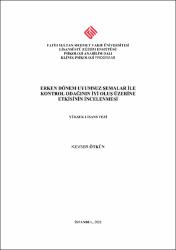Erken Dönem Uyumsuz Şemalar ile Kontrol Odağının İyi Oluş Üzerine Etkisinin İncelenmesi
Citation
ÖTKÜN, Kevser, Erken Dönem Uyumsuz Şemalar ile Kontrol Odağının İyi Oluş Üzerine Etkisinin İncelenmesi, Fatih Sultan Mehmet Vakıf Üniversitesi Lisansüstü Eğitim Enstitüsü Psikoloji Anabilim Dalı Klinik Psikoloji Programı, Yayımlanmamış Yüksek Lisans Tezi, İstanbul 2021.Abstract
Bu çalışmada erken dönem uyumsuz şemalar ile kontrol odağının iyi oluş
üzerindeki etkilerinin incelenmesi amaçlanmıştır. Çalışmaya 18-72 yaş arasında 321
kadın ve 241 erkek olmak üzere toplamda 562 kişi katılmıştır. Çalışma verileri
PERMA Ölçeği, Young Şema Ölçeği Kısa Form-3 ve Kontrol Odağı Ölçeği
kullanılarak toplanmıştır. Çalışmada erken dönem uyumsuz şemalar ile kontrol
odağının iyi oluş parametreleri üzerindeki etkilerini belirlemek amacıyla Çoklu
Doğrusal Regresyon Modelleri tahmin edilmiştir. Kurulan regresyon modelleri
sonuçlarına göre, erken dönem uyumsuz şemalar ve kontrol odağı alt boyut puanları
PERMA Ölçeği Olumlu Duygular puanını %21, Bağlanma puanını %16, Olumlu
İlişkiler puanını %21, Anlam puanını %27 ve Başarı puanını %21 oranında
açıklamaktadır. PERMA Ölçeği alt boyutlarının yordanması amacıyla kurulan
regresyon modellerinde, Kontrol Odağı Ölçeği alt boyutlarından yalnızca Kişisel
Kontrol alt boyutu puanı tüm modellerde anlamlı çıkarken, Young Şema Ölçeği alt
boyutlarından ise yalnızca Sosyal İzolasyon/Güvensizlik Şeması alt boyutu puanı
tüm modellerde anlamlı çıkmıştır. Bununla beraber, kurulan regresyon modellerinde
farklı Young Şema Ölçeği alt boyut puanları ve Kontrol Odağı Ölçeği alt boyut
puanları da PERMA Ölçeği alt boyut puanlarının açıklanmasına katkıda
bulunmaktadır. Bu çalışmada elde edilen bulgular, ilgili literatür ışığında tartışılmış,
klinisyenlere ve araştırmacılara yönelik öneriler sunulmuştur. In this study, it is aimed to examine the effects of early maladaptive schemas
and locus of control on well-being. A total of 562 people, 321 females and 241
males, between the ages of 18-72, participated in the study. Study data were
collected using the PERMA Scale, Young Schema Scale Short Form-3, and Locus of
Control Scale. In the study, Multiple Linear Regression Models were predicted in
order to determine the effects of the locus of control on well-being parameters with
early maladaptive schemas. According to the results of the predicted regression
models, early maladaptive schemas and locus of control sub-dimension coefficients
explain the PERMA Scale's Positive Emotions coefficient by 21%, the Engagement
coefficient by 16%, the Positive Relationships coefficient by 21%, the Meaning
coefficient by 27%, and the Accomplishment coefficient by 21%. In regression
models to predict the subscales of the PERMA Scale, on the one hand, only the
Personal Control sub-dimension coefficient from the Locus of Control Scale was
significant in all models, on the other hand, only the Social Isolation/Insecurity
Schema sub-dimension coefficient from the Young Schema Scale sub-dimensions
was significant in all models. In addition, different Young Schema Scale sub dimension coefficients and Locus of Control sub-dimension coefficients in the
predicted regression models also contribute to the explanation of PERMA Scale sub dimension coefficients. The findings obtained in this study were discussed in the
light of the relevant literature and suggestions for clinicians and researchers were
presented.



















